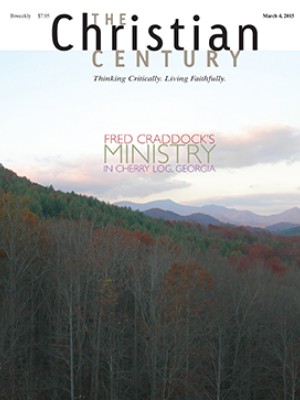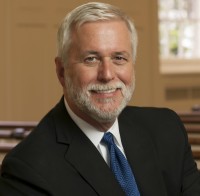Lone leaders
Pastors often talk about their loneliness, even though in their work they’re surrounded by many people. What pastors mean by loneliness is not what most people think of it as. And it’s not unique to their calling.
According to more than one editorialist, President Obama has given up on building a grand American consensus and is now focused on what he always wanted to do as a leader. His old slogan “Yes we can” has become “I’ll figure out a way.”
This makes me wonder exactly what goes on in the mind of a leader who tires of building consensus and just strives to get things done. Americans have never agreed about anything. So our greatest presidents eventually found ways to be loyal only to the still small voice that kept whispering in their ears, “You know what you need to do.”
Read our latest issue or browse back issues.
This is how Washington found himself leading a revolution, how Lincoln got us through the Civil War, and how Roosevelt pulled the nation out of a depression. They were never leading a parade.
Opponents threw everything they could at them. All of these presidents had flaws that made them easy targets for gossip. And the politics of accomplishing their goals were staggering. At the end of every long day they were completely alone, but they kept moving in the right direction, haunted by a still small voice that would not let them stop.
The most striking portrait of John F. Kennedy depicts him standing alone in the White House with his head bowed down, lost in a ponderous thought. I think he’s arguing with the still small voice. I can hear him saying, “They will never buy it.” But the voice just kept pushing him into his lonely convictions about leadership.
It doesn’t matter if you are leading a nation, company, congregation, school, or family—a time comes when you just have to do what you believe to be right. You give up on consensus, being admired, or even appreciated. It’s the inner voice you have to serve.
This is never how the leader begins. Even the process of being chosen implies a contract to serve those who made the choice, and all leaders assume that means figuring out a way to bring everyone together around a spectacular dream. But it just doesn’t work out that way in the end. We shoot our dreamers. Sometimes literally, but always metaphorically.
There is something in our ever-so-democratic, antihierarchical, big-on-transparency, questioning-the-process affections that make us resist this core of leadership. But the Bible is filled with examples of women and men who had a vision from God and knew they had to throw their lives into fulfilling it even if it meant leaving town in a shower of rocks. It’s hard to find a prophet, apostle, or Jesus in search of a grand consensus.
I understand that crazed suicide bombers also listen to voices in their heads. But that involves mental illness. And I know that many churches have been devastated by a messianic, narcissistic pastor. But these abuses of power cannot prevent a congregation from living out of a vision from God. There is nothing in the history of Christianity to support the “best practices” principle that a vision arises from a strategic planning retreat.
What we’ve always needed is a visionary leader, someone who hears the still small voice and is made lonelier because of it, but who understands what God means by a “calling.” It’s more than a bureaucratically sanitized job description. It’s a holy passion that overtakes your life.
I often have the opportunity to talk to young adults about their calls. Some are clear about what they must do and just need advice on how to do it. Others struggle with the whole notion of calling. They talk in circles, show me their journals, and offer exegesis of their Myers-Briggs personality patterns. We pray. But they leave my office without either of us getting a glimpse of a burning bush. Then it occurs to me—they have no visions worthy of their lives.
Every leader has to begin with a passion for at least one or two great visionary ideas. In time the ideas will mature, and offer strategies for a focused leadership. But we don’t shop for these holy ideas. They seek us.
A vision from God doesn’t have to arrive through a supernatural revelation. The call can be stuck in a theology textbook that was abandoned after a final exam. It can arise through a late-night conversation with friends or on a trip to the West Bank. My wife once heard Nat King Cole singing “O Holy Night” on the radio. When he came to “till he appeared and the soul felt its worth,” she couldn’t stop crying. Heaven is inflaming bushes around us all of the time. The question is, are we paying attention?
I am certain that we must. There is no such thing as a vibrant congregation without a leader who’s been called to burning bushes and great ideas and is willing to surrender everything to them.






